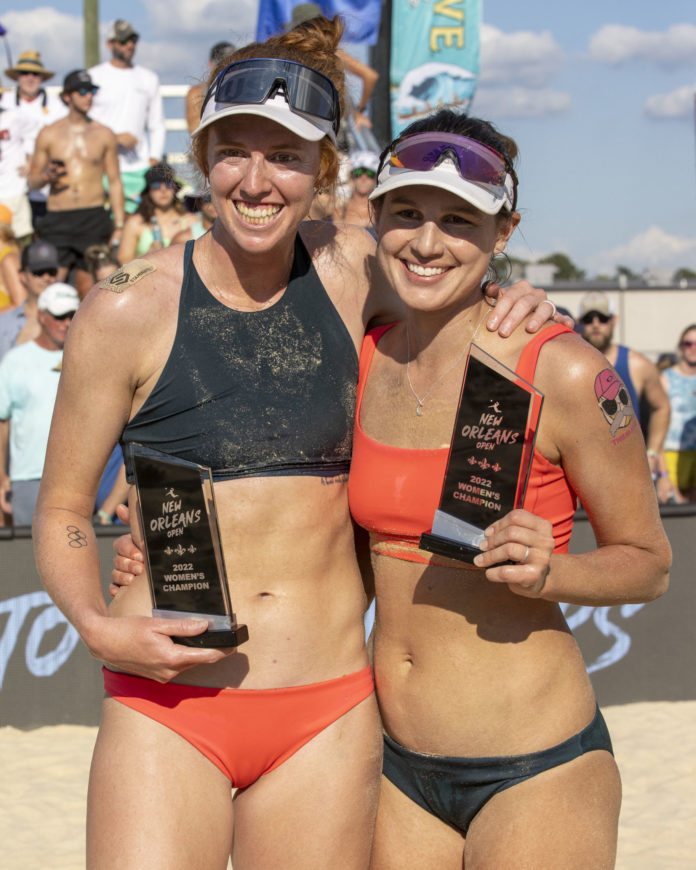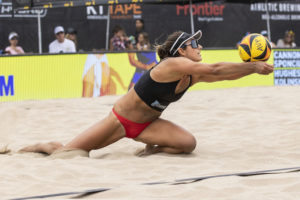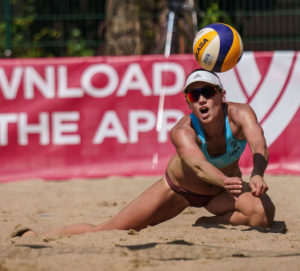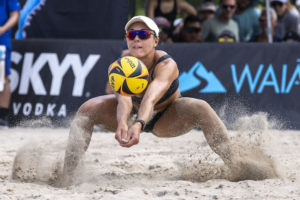Crabb-Brunner survive China-Brazil travels, advance into Brasilia Elite16 main draw
May 1, 2024
September 26, 2022
HERMOSA BEACH, Calif. — As the 2022 AVP Tour season continued through August, the strangest — and most welcome — of streaks somehow continued: There had yet to be a repeat winner on the women’s side of the Tour.
It’s an amazing thing, what happens when April Ross isn’t playing beach volleyball: Everyone else has a chance. Since Donald Sun resurrected the AVP in 2012, Ross has won 33 AVP titles in 48 tournaments, including five straight dating back to July of 2020, the onset of the Champions Cup. When she and Alix Klineman won the Olympic gold medal at the 2021 Tokyo Olympics, she cemented her permanent residency in the GOAT Pasture.
Ross’ absence this season presented enormous intrigue as to who would fill her shoes as the most dominant female player leading the most dominant female team.
“it was Misty [May-Treanor] and Kerri [Walsh Jennings] from ’02 all the way up until 2012, and then enter April playing with Kerri in ’16, then April playing with Alix [Klineman] who established themselves as far above the next,” Dain Blanton said on a recent episode of SANDCAST. “You knew if you were to win a tournament you had to go through that team. Usually on the men’s side you had to go through Phil [Dalhausser] or Jake [Gibb]. This is the first time almost on both sides there’s almost a reset: Who’s going to be that guard? Be that team where, ‘OK, if I want to win a tourney, I need to go through them’? It’s a time where everything is settling in.”
Nearly five months later, there has been the slightest of settling, with 24-year-old Kristen Nuss and Taryn Kloth, 25, respectively, who will likely forever be known as the LSU Girls.
Only Nuss and Kloth, our 2022 VolleyballMag Team of the Year, won multiple AVP Pro or Gold Series titles this year, opening and closing the “regular season†with victories in Austin and Chicago. Although the Phoenix Championships were not included when it came to determining our awards, for reasons we’ll list below, Nuss and Kloth dominated all six sets they played, without a single team coming anywhere close to stealing a set off them.
“You just see the look in Kristen’s eyes and she is like: ‘It is go time. I don’t want to have anything touch the sand,’†Kloth said after Phoenix. “And that’s when you go. When Kristen gives you the look, you just go.â€
And go they did, as did a number of other young talents emerging as professionals this season.
Every week, it seemed, the whimsical and subjective list of Best Player Yet To Win An AVP was whittled down even further, as three consecutive tournaments were won by first-time victors: Terese Cannon and Sarah Sponcil (Hermosa Beach), Tina Graudina and Hailey Harward (Fort Lauderdale), Julia Scoles and Geena Urango (Atlanta). Only three winning teams this season — Nuss and Kloth, Kelly Cheng and Betsi Flint, and Sara Hughes and Kelley Kolinske — included players who had previously won an AVP tournament.
Had Bally’s allowed gambling on the sport this year, it’s a wonder where the majority of the money would have gone. The best part of all this parity, however, is that the level of play wasn’t diminished, the bar lowered. Every aforementioned team, and many not yet mentioned — Zana Muno and Brandie Wilkerson, Wilkerson and Melissa Humana-Paredes, Humana-Paredes and Sarah Pavan, Pavan and Graudina, Megan Kraft and Emily Stockman — played perhaps the best beach volleyball of their individual careers. Even with Ross and Klineman sitting the season out, the proverbial rising tide lifted all boats on the women’s side this season, setting up what should be a 2023 year that will, in all likelihood, surpass this one in terms of quality and intrigue.

When Cheng partnered with Sarah Sponcil in 2019, eventually becoming the youngest team in American history to qualify for an Olympic Games, they became trailblazers in one of the most unique styles of play of any female team in the world, using a dynamic offense driven by an abundance of options and creative hitting routes that made it a nightmare for opposing teams to consistently defend. Even with a new partner in Betsi Flint, Cheng’s offensive efficiency didn’t slow down. Her lowest — lowest — hitting percentage in any of the seven Pro and Gold Series events this season was .433, in Hermosa Beach, a tournament in which she and Flint made the finals. She led the field in Chicago, hitting .597, an astronomical efficiency considering the difficulty of many of the balls she was attacking: options with limited vision and tremendous amounts of back spin that make it significantly tougher to hit a ball clean. Didn’t matter. She’d finish the season leading the AVP in hitting percentage.
Defensively, her blocking, combined her AVP-leading 64 aces, made her and Flint one of the most difficult teams to score on, which helps explain why they made the semifinals in all but one event. As far as all-around performances go, none eclipsed Cheng’s in 2022.

One of the most common refrains from the men who had to play against Miles Partain this season was this: “We couldn’t stop him on two, so we started serving him … and then we couldn’t stop him on three.†The same could be said about Cheng. Watch the film of their finals of the Manhattan Beach Open — even though they eventually lost — against Kelley Kolinske and Sara Hughes, and you’ll see what a burden it is on opposing blockers playing against Cheng. Kolinske is never comfortable, oftentimes hovering halfway in the court so as to defend against the option. If Cheng sets Flint, Kolinske then has to scramble to get in front of her.
This goes for essentially all blockers attempting to stop or contain Flint and Cheng. The amount of physical and mental energy it takes to consistently stump them, largely due to Cheng’s ability to option so well, is difficult to sustain for an entire match, much less several of them. Cheng and Flint finished the AVP regular season 25-7, and won 10 of 13 matches that went the full three sets. To borrow a phrase: There is no outright stopping their offense; you can only hope to contain it.

Is this the Era of the American Defender? Every defender who made honorable mention won at least one medal on the Volleyball World Beach Pro Tour — Kristen Nuss won gold in both Kusadasi, Turkey, and Coolangatta, Australia, with Taryn Kloth; Sarah Sponcil took bronze in Kusadasi with Terese Cannon; Zana Muno won bronze in Coolangatta with Toni Rodriguez; Sara Hughes won gold in Itapema with Kelley Kolinske — and Betsi Flint, the only American to win a medal in an Elite 16, didn’t even make our list of best defenders this season. Every single defender mentioned averaged more than six digs per set over the course of the AVP season. That’s how stacked the U.S. is on the defensive end. Only Zana Muno, with 7.2 digs per set, proved more difficult to score on than Sponcil (6.99) this season, but defense is a holistic position, and Sponcil’s offensive efficiency in transition is what sets her apart, not only from her peers, but from herself from a year ago.
If there were a tiny gap in Sponcil’s game from the 2021 defender who made the Tokyo Olympics, it was the occasional offensive rut. Such was not the case in 2022. Under new coach Scott Davenport, Sponcil was just as menacing on defense yet even more terminal in transition, which helps explain why she was able to take a new blocker in Cannon and still win the first AVP of her career, in Hermosa Beach, and enter the Phoenix Championships seeded second.

Four years ago, Brandie Wilkerson was voted by her peers on the FIVB as the Best Blocker in the World. Anyone watching the 2022 AVP season could easily see why. Despite standing just 5-foot-10 — six inches shorter than Taryn Kloth, four inches below Kelly Cheng and Terese Cannon, and two inches shy of Kelley Kolinske — Wilkerson led every single AVP she played this year in blocks. She was the only player in Fort Lauderdale to average more than 1.5 blocks per set, swatting 1.90. She pushed that average higher in Manhattan, blocking 2.54 per set en route to a third place finish with Zana Muno.
You needn’t look far to understand why Wilkerson finished all five AVPs she played in the top five: Just watching her block is explanation enough.

When Cannon made her first AVP semifinal, in Chicago of 2018 — coming out of the qualifier with Sarah Sponcil — everyone knew she could play at a high level. But could she do it consistently? Her results over the next three seasons were mixed, as a third in Austin of 2019 was followed by a ninth, another third in Manhattan Beach followed by a 17th. She didn’t make it out of the qualifier in the AVP Champions Cup, and 2021 featured another mixed bag: a third in Atlanta, 13th in Manhattan, seventh in Chicago. But as the 2021 international schedule wound down, Cannon broke through, winning three straight medals, closing the year with a bronze in Itapema, Brazil, with Sara Hughes.
This season, she proved those consistent finishes overseas to be no fluke, winning her first career AVP in Hermosa Beach, making another final in Atlanta, and two more semifinals to end the season in Manhattan Beach and Chicago. Cannon, long known for her “potential†to become an elite blocker has settled into that role, and her stock is only going up from here.

Kan, the Hawai’ian who played indoors at Missouri before moving to the beach, is annually one of the most overlooked players, mostly by virtue of her still living in Hawai’i, away from the spotlight of California. And yet she’s always in the mix, leaving fans and players alike to wonder why so few ever talk about how good she is .
When it comes to discussing the best defenders in the country, rare is the time that Betsi Flint’s name is thrown into the mix. Same for best offensive players. Yet she wins. With everyone. She’s won with Kelley Kolinske, with Emily Day, and now she’s doing so again with Kelly Cheng. Why? Because all of the most under-looked skills in the game, all of the intangibles, are where Flint shines. She’s quiet, and not flashy in her play. She’s also not the most touchy-feely person you’ll meet. Yet watch her and Cheng play, and she’s handing out three, four, five high-fives in a row. She’s hugging Cheng, holding her hand. She’s chatty. She’s a hypeman.
She is, in short, one of the best partners in the game, becoming exactly who she needs to be, with whomever she’s playing. That’s a skill, and it can be practiced, and Flint is a shining example of being a phenomenal partner. Yet we live in an age of shiny highlights and made-for-Instagram plays, plays which you won’t see a ton of from Flint. She makes almost all of the plays she should make, taking advantage of the imperfect shots opponents hit and converting at an exceptional rate in transition.
She is a quiet winner.
She is Mrs. Underrated.

Dain Blanton has one of the best stories when it comes to Julia Scoles. On the eve of the 2022 NCAA Championships, Blanton received a call from the USC trainer, who had some bad news for the coach: One of the players was up sick all night.
“Who is it?†Blanton wondered.
“Julia Scoles.â€
And then Blanton sighed a relieved sigh. No coach ever wants any of his athletes to be sick, of course, especially on the night of the biggest tournament of the year, but if he had to pick one, it would be Scoles. Why? Well, you can see for yourself: It was Scoles who would score the championship-sealing point, helping USC win its second consecutive NCAA title, setting up what would become a wildly successful rookie campaign on the AVP.
That toughness and grit was on display over the next several months, as Scoles, partnered with Geena Urango, would make five straight semifinals and win her first event in Atlanta, which came the week following her first finals appearance, in Fort Lauderdale.
Now, Scoles has established herself as one of the top international prospects for American defenders, and already she’s registered for Challenger events in the Maldives and Dubai with Zana Muno.

July 10, 2022, featured one of the cooler feats of the AVP season: Scott Davenport won the Hermosa Beach Open twice, leading both Chaim Schalk and Theo Brunner to the men’s title, and Sarah Sponcil and Terese Cannon to the women’s. As far as anyone has been able to tell, that is the only time in AVP history a coach has won the same tournament with two teams in the same year.
But it wasn’t just one sublime weekend that makes Davenport the Coach of the Year. He helped oversee the exponential growth of both Terese Cannon and Sarah Sponcil, the former who was named the Most Improved, the latter who was a nominee, this despite already being one of the best defenders in the country before she began working with Davenport. He helped Cannon transform from an exceptionally talented but streaky blocker into one of the most consistently elite performers in the country. He took Sponcil and made her an improved version of the defender who qualified for the 2021 Tokyo Olympics. There’s a reason the courts on 24th street in Hermosa Beach are always so packed: Scott Davenport’s there.
This match (the YouTube video is below) had it all: The top two teams on the AVP, a burgeoning rivalry, a comeback, another comeback, lead changes, a frenetic third set that went the distance, all the way to 25-23. As you can see from the list below, virtually any time these two teams met, it made for must-watch television, none more requisite viewing than the semifinals in Chicago.
Austin first round: Terese Cannon-Sarah Sponcil vs. Toni Rodriguez-Savvy Simo
Austin semifinals: Melissa Humana-Paredes-Sarah Pavan vs. Emily Day-Emily Stockman
New Orleans third round: Kelly Cheng-Betsi Flint vs. Megan Kraft-Emily Stockman
Hermosa Beach semifinals: Terese Cannon-Sarah Sponcil vs. Sara Hughes-Kelley Kolinske
Hermosa Beach semifinals: Kelly Cheng-Betsi Flint vs. Julia Scoles-Geena Urango
Fort Lauderdale third round: Tina Graudina-Hailey Harward vs. Taryn Kloth-Kristen Nuss
Fort Lauderdale third round: Kelly Cheng-Betsi Flint vs. Sara Hughes-Kelley Kolinske
Fort Lauderdale finals: Tina Graudina-Hailey Harward vs. Geena Urango-Julia Scoles
Atlanta first round: Zana Muno-Brandie Wilkerson vs. Emily Stockman-Megan Kraft
Atlanta third round: Sara Hughes-Kelley Kolinske vs. Zana Muno-Brandie Wilkerson
Atlanta first round contenders: Allie Wheeler-Deahna Kraft vs. Megan Kraft-Emily Stockman
Atlanta finals: Julia Scoles-Geena Urango vs. Sarah Sponcil-Terese Cannon
Manhattan third round contenders: Molly Turner-Torrey Van Winden vs. Julia Scoles-Geena Urango
Manhattan fourth round contenders: Molly Turner-Torrey Van Winden vs. Sarah Pavan-Mackenzie Ponnet
Manhattan Beach finals: Betsi Flint-Kelly Cheng vs. Kelley Kolinske-Sara Hughes
Chicago first round: Sarah Pavan-Tina Graudina vs. Carly Kan-Kaitlyn Malaney
Chicago quarterfinals: Kristen Nuss-Taryn Kloth vs. Sarah Sponcil-Terese Cannon
Chicago quarterfinals: Betsi Flint-Kelly Cheng vs. Kelley Kolinske-Sara Hughes
Chicago quarterfinals: Taryn Kloth-Kristen Nuss vs. Tina Graudina-Sarah Pavan
Chicago semifinals: Melissa Humana-Paredes-Brandie Wilkerson vs. Terese Cannon-Sarah Sponcil
Chicago finals: Taryn Kloth-Kristen Nuss vs. Melissa Humana-Paredes-Brandie Wilkerson
Tuesday: The VBM AVP men’s awards